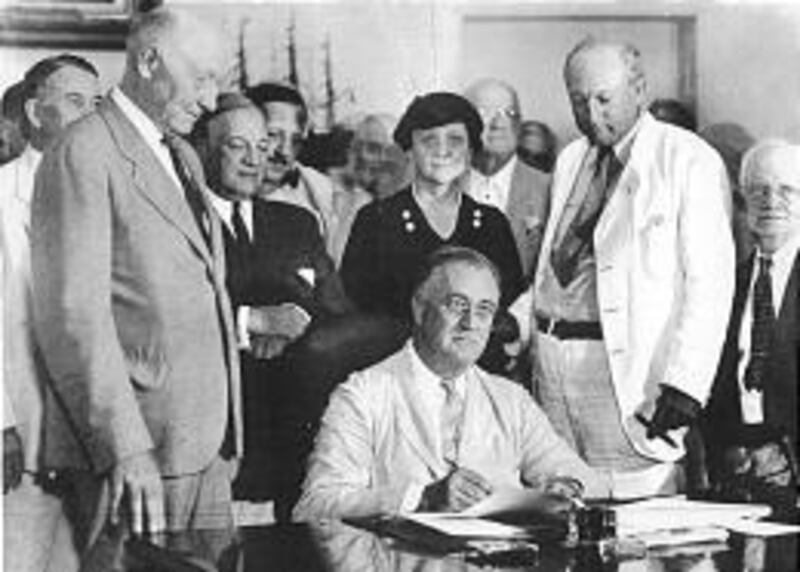In 1935, Cal Rampton was working as a congressman's administrative aide in Washington, D.C. He was 21 years old and fully aware of groundbreaking legislation passing through Congress that year, in the midst of the Great Depression.
One measure called for creation of a "social security" program. While his parents never received what would become known as Social Security checks, Rampton — later to become a three-term governor of Utah, from 1965 to 1977 — remembers the impact of that law on aging neighbors.
The program offered a chance at stability and independence. It stretched budgets.
"I knew many elderly people that would not have had adequate means and were really dependent," says Rampton, now 91.
"I was quite cognitive of what was going through Congress. I was supportive of the dealmakers."
Today, the resulting "social insurance" program, while modified and facing challenges to its solvency, turns 70 years old, the Social Security Act having been signed into law by President Franklin D. Roosevelt on Aug. 14, 1935.
President Bush spurred debate last winter when he made changes to Social Security a centerpiece of his State of the Union address. Debate had faded by summer, but Congress and interest groups are gearing up for a fight this fall over the program's future. House Republicans still hope to vote on some version of the revisions.
Regardless of current opinions of the program, it's a day to celebrate, according to pundits and Social Security administrators. Since inception, nearly 200 million Americans have received Social Security benefits. About $8.4 trillion has been paid out, beginning with the first monthly checks in January 1940.
"It is part of the fabric of the United States," said Doug Smith, public affairs specialist for the Social Security Administration's Denver office. "It has had such a beneficial effect on people. It's probably the most successful government program that's been invented."
When created, Social Security only gave retirement checks to the worker who paid into the program, according to the administration's Web site. In 1939, the program was changed to include payments to a spouse and dependents of a retired worker. Benefits were also given to survivors if a person who paid Social Security died. Disability benefits were also added.
"When Franklin Roosevelt signed the legislation into law, I'm not sure even he realized the significant role the program would play in the next seven decades," Jo Anne B. Barnhart, commissioner of Social Security, said in a press release.
"Retirement was something that happened when you could no longer work — not something you planned for in advance."
The first recipient of a Social Security check was Ernest Ackerman, according to the Social Security Administration's Web site. He retired one day after the program began, paying a nickel into the program. Ackerman received a 17-cent Social Security lump-sum payment.
Later, the program changed to begin providing monthly payments. The first monthly check was given to Ida May Fuller. It was for $22.54.
For Rampton, Social Security checks are a "significant" part of his monthly budget. "I can certainly live without it," he said in a Deseret Morning News interview. "But it raises my standard of living substantially."
Said President Roosevelt, in a radio address on Social Security's third anniversary: "The Social Security Act offers to all our citizens a workable and working method of meeting urgent present needs and of forestalling future need."
He continued: "We have come a long way. But we still have a long way to go. There is still today a frontier that remains unconquered — an America unclaimed. This is the great, the nationwide frontier of insecurity, of human want and fear. This is the frontier — the America — we have set ourselves to reclaim."
President Bush's proposals for Social Security's include trimming future benefits for high- and middle-income earners. His ideas have yet to get traction.
And he and House Republicans have yet to build a groundswell for shifting a portion of Social Security payroll taxes to individual accounts for younger workers. Whatever returns these investment accounts earn would supplement future benefits.
For more information on the history of Social Security, log on to: www.socialsecurity.gov/history. Answers to general questions about Social Security's future can be found at: www.socialsecurity.gov/qa.htm.
Contributing: Associated Press
E-mail: nwarburton@desnews.com

